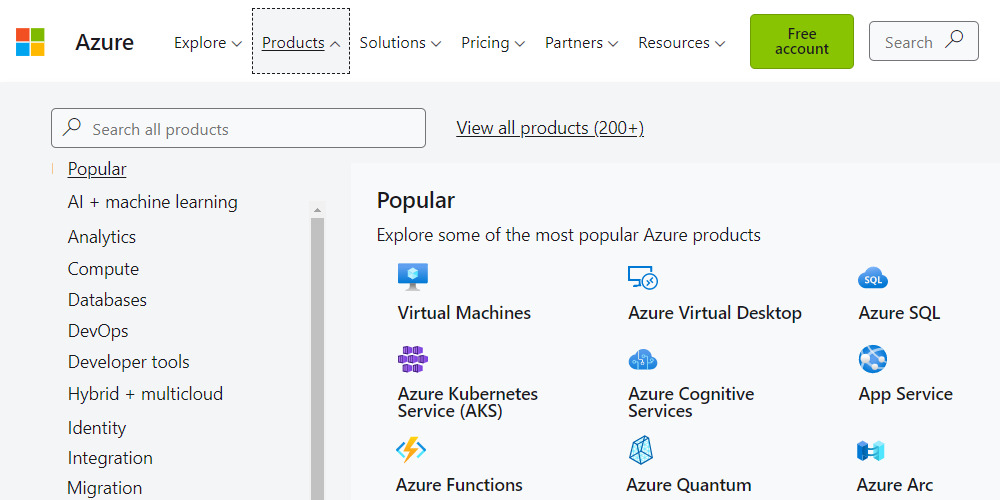Among the cloud computing options, choosing Microsoft Azure for your data migration is a good bet. There are many benefits of migrating your data to the cloud, but especially to Microsoft Azure.
Over the years, we’ve seen cloud computing as a tremendously growing phenomenon. Enterprises big or small are having a change of mindset, willing for cloud migration in the anticipation of a bright future.
» LEARN MORE: See Why Azure Makes The Difference Both in Performance & Costs
Cloud Migration is the ticket to high organizational flexibility, security, and cost effectiveness for any organization to accomplish their goals. It was counted as the wave of the future a few years ago with Cloud market expected to reach USD 947.3 billion by 2026.
A shift to digital business seems to be the best solution as this allows companies to relocate and source their resources and infrastructure to somebody else.
What Is Microsoft Azure?
Microsoft Azure, formerly Windows Azure, is a universally available cloud-computing service by Microsoft. The application management service is handled by Microsoft data-centers. It provides a wide range of services including Software as a Service (SaaS), Infrastructure as a service (IaaS), and Platform as a Service (PaaS).
The platform was initially released thirteen years ago. On October 27, 2008 by the name “Project Red Dog,” which then changed into Windows Azure in 2010 and finally to Microsoft Azure in 2014.
The service supports a variety of programming languages, tools, as well as frameworks and is widely known for offering over 600 services worldwide.
Azure has been labeled as a “cloud layer” above several Windows server systems. It’s widely known for the use of Windows server 2008 and Azure Hypervisor for the virtualization of services.

How Does Azure Work?
Azure helps out enterprises to reach their organizational goals through its pay-as-you-go services. In other words, Microsoft charges companies just for the services they use through the Azure portal.
Azure offers a number of packages, ranging from basic to premier with customer support plans.
In addition, reserved instances are a pre-purchase, a Microsoft Azure pricing policy that can be a great choice for you, if you’ve high demand workload.
Services Azure Offers
Compute Services: Azure provides compute services in three categories, namely (IaaS), (PaaS), and serveless. These services help you deploy virtual machines in the Azure cloud and they support access to remote applications.
Mobile Services: These services help you in collecting real-time statistics regarding user behavior. Data is easily accessible for users due to its linkage with on-premise and Azure SQL servers.
Storage Services: Azure provides a wide range of storage services. It includes Blobs, Files, Queues, Tables, and disks that give you increased scalability for structured as well as unstructured data.
Communication Services: This category provides SDK for the production of communicative applications for SMS, video calls, and many more services.
Media services: This set of services help you via PaaS in the process of content creation or analyzing statistics.

Why Prefer Cloud Migration
Before shedding light on why you or your organization should opt for cloud migration, let us first have a look at the basics.
What Is Cloud Computing?
Cloud computing is the dispatch of network services with remote servers rather than the local ones. Cloud computing hosted on the internet for several purposes from the management of applications to data storage and processing.
What Is Cloud Migration?
The process of moving a company’s data, digital assets, and services, among others, from local to remote servers is known as cloud migration.
Covid-19 brought a spike in Enterprises choosing partial cloud migration, leaving legacy systems behind. Shifting businesses to clouds brought a great deal of real-time development for several organizations.
Cloud Migration tops the list of options for increasing business efficiency and scalability. But before choosing it, you must have a proper layout for the goals you want to fulfill through this migration.
Benefits of Being on the Cloud
Cost-effectiveness
The top-most perk of cloud migration is it’s cost-friendly nature and the pay-as-you-go model it is based on. This helps your organization in saving up the money that goes into maintaining and managing local servers.
Improved security
Several cloud providers provide an enhanced level of security for the user’s data, by regulating it through security patches.
Ease in management
Cloud providers help enterprises in the management of cloud as well as on-premise data with central management tools.
Improved Backup and Recovery
Several cloud providers help organizations with the backup of their data through built-in features making it a convenient task.
Compliance
Compliance issues really give headaches to organizations. When it comes to cloud, you can be rest assured as cloud providers have certifications for the protection of data.
7 Business Giants Which Moved to the Cloud
There are companies and organizations that made the most out of cloud migration. They addressed some of their peak concerns such as soaring customers and need for scalability. Some of these companies are listed below:
Netflix
Widely popular as the biggest and the most advanced movie streaming platform, Netflix is counted as first among the companies that migrated to cloud.

The factor which made the organization opt for the migration was a tremendous increase in their data and user statistics, that couldn’t be stored on their current data-centers.
Siri
A household name to iPhone users, Siri is a virtual voice assistant by Apple Inc. that answers to people’s queries and is actually operated through a cloud where the questions are analyzed.
Apple
iCloud, Apple’s cloud-computing service, helps users in storing their photos, documents, and data on a remote server that is conveniently accessible to them.

Instagram is a worldwide popular social networking site for sharing photos and promoting business. It migrated its data to the cloud to manage the spike of user data and statistics with every passing year.
Spotify
The popular music-streaming platform decided to opt for migration as their own data-centers were incapable of achieving the company’s goal of providing the “best music in the world” while facing several difficulties in managing and maintaining their data.
Pinterest is known as one of the first cloud-computing success stories The company has seen great success from the time of its establishment. However, due to their rapidly growing data volume every passing day, they found being on cloud as the best, sensible choice.

Etsy
The popular e-commerce platform migrated over to the cloud for the scalability of their business in 2020. This saved them the time spent in the maintenance of their infrastructure into providing more productive ways for sellers or online businesses.
7 Benefits of Migrating to Microsoft Azure
Considering that several notable companies have opted for cloud-computing as their preferred choice and owing to the advantages of cloud migration, we believe you got that push you needed to plan your strategy for migration.
There are several reasons for you to switch to Microsoft Azure cloud services. Let us have a look at the seven benefits of migrating to Microsoft Azure:
1. Azure Is Secure
Whenever we talk about cloud computing, one of the most important aspects to look for is security. Microsoft Azure is a certified cloud provider of security tools and built-in features for the protection of your data.
Features of Azure Security
Network Security: Azure network security secures your data on the cloud from cyberattacks including the widely known and destructive ransomware attacks.
Infrastructure Security: Azure runs in data centers operated by Microsoft that believes in observing the industry standards such as ISO/IEC 27001:2013 and NIST SP 800-53, for security.
Virtual machines security: Azure virtual machines security help you in protecting your machines from viruses and are quite competent in analyzing destructive threats.
2. Azure Is Cost-Effective
Azure provides you with cost-effective migration of your IT infrastructure to the cloud. Enterprises mostly choose cloud computing for it’s cost-effectiveness. With Azure Archive storage, Microsoft provides their lowest-priced storage system to help you backup your data that can’t be stored on-premise servers.
Azure Reserved Instances is another cost-friendly pricing policy that helps you save upto 72%, in contrast to the pay-as-you-go policy. Enterprises pay for a year or three years plan and avail all the Azure tools and features.
Windows Server customers with software assurance can make the most out of Azure VM RIs by combining them with Azure Hybrid Benefits, and save upto 82% of the cost in contrast to pay-as-you-go.
3. Azure is conveniently accessible
There is nothing more satisfying than the feeling of conveniently getting access to your data, no matter where you are.
With the help of moving your business’s IT infrastructure to Azure cloud, you can have a 24/7 access to your data.
4. Azure Improves Scaling
Scaling is known as the ability to control traffic on web applications. Azure services offer you automatic upwards or downwards scalability, according to the traffic or workload.
This enables enterprises to scale up their server space to store the high volumes of data that can’t be stored on local servers. This reduces the cost that went into the production of infrastructure and workforce needed to run it.
5. Azure Is Flexible
When we think about migrating to the cloud, a question which appears in our head is:
What about legacy applications and systems not compatible with the cloud?
Well, you don’t have to worry as Microsoft Azure cloud is flexible enough to work with your on-premise servers. It doesn’t restrict you to the cloud-only approach like that of Amazon Web Services (AWS).
Migration to Azure Cloud services allows apps on Windows or SQL servers to enjoy the benefits of three-year free security patches, giving organizations the time they need to update their layouts for legacy systems.
6. Azure Enhances Mobility
Azure Mobility services help app developers in the creation of cloud-powered apps. App developers can make the most out of cloud computing in this way and can shift app data to the cloud. With the Azure Mobility services, the scaling and integration of apps is simplified.
7. Azure Enhances Compliance
Microsoft enables the professionals from enterprises to legally regulate their business with compliance-effective tools and features.
Azure provides organizations with the tools, but they are in charge of controlling the environment by following all the cloud computing laws.
Companies can conveniently show their customers their ways of dealing with the industry’s compliance criterion, in the form of compliance certifications.
Organizations can completely trust Azure for the security and protection of their data, since Azure compliance offerings are created by the cooperation of 1400 lawyers and public policy professionals from Microsoft along with compliance leaders.
Need for a Competent Partner To Help You Migrate
Cloud computing is getting widely known, as 94% of the enterprises have adapted it wholly or partially. It is estimated that by 2025, the data stored on cloud might exceed 100 zettabytes.
The idea of Azure cloud migration is surely an attractive one after looking at the perks that followed with enhanced levels of business continuity.
However, this idea can only turn into a smart choice if you have a properly planned layout. Analyze all the relevant statistics, and study the nature of your business shift.
Having a proper strategy to reach your organizational goals might be challenging but with the help of a competent partner, you can escape all the hassles.
LogicV has a competent team waiting to help you plan the best Azure migration strategy for your organization.

Frequently Asked Questions
Microsoft Azure is an open-source, cloud-computing service by Microsoft. It is popular for its Platform as a service (PaaS), Infrastructure as a service (IaaS), and Software as a service (SaaS).
Azure provides a high level of data protection, reduced cost of infrastructure, and enhanced scalability as well as ease of data accessibility, great data backup and recovery, among other benefits.
Microsoft Azure is an open-source, cloud-computing service by Microsoft. It is popular for coming up with Platform as a service (PaaS), Infrastructure as a service (IaaS) and Software as a service (SaaS).
Migration to the cloud is counted as the need of time. Migrating benefited several enterprises by being cost-friendly, upgrading their security as well as providing great data Backup and recovery options.
Azure cloud services helped companies a great deal with the management of the applications of several natures, through their effective tools.
